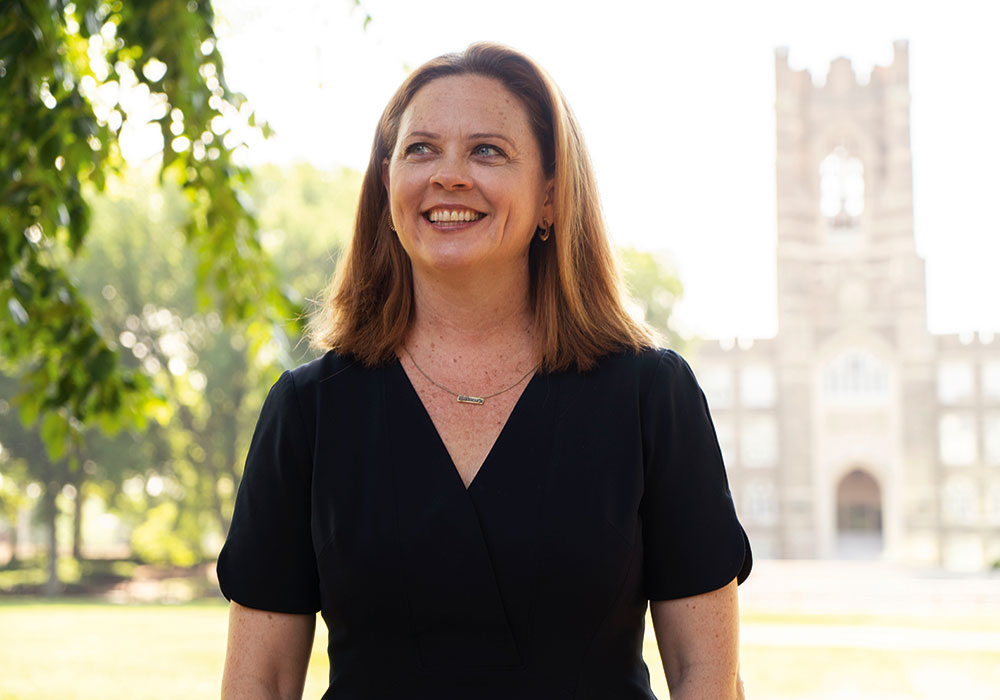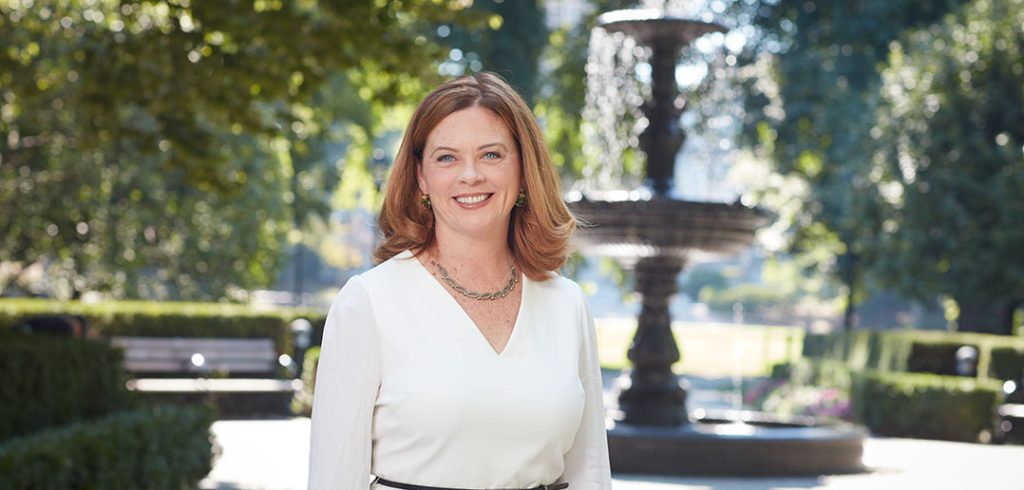She is the first layperson and first woman to lead the Jesuit University of New York in its 181-year history.
A graduate of Tulane University and Harvard Law School, she has been a changemaker for decades—as a scholar, professor, federal prosecutor, community advocate, and university leader. When the Board of Trustees announced her appointment in February, Tetlow said she was “honored beyond measure” to have been chosen as Fordham’s next president, and she pledged to come to the University with “my whole self—as a leader and a teacher, as a wife and a mom, and a person of faith.”
By way of introduction, here are 33 things to know about the 33rd president of Fordham University.
1. She is a trailblazer.
Even before she made history at Fordham, Tetlow blazed a trail at another Jesuit university, Loyola New Orleans, where she was the first woman and first layperson to serve as president. At Jesuit universities, she has said, mission “isn’t something we ask of the dozen priests on our campus; it’s the responsibility of each and every one of us.”
2. Fordham is where her parents met.
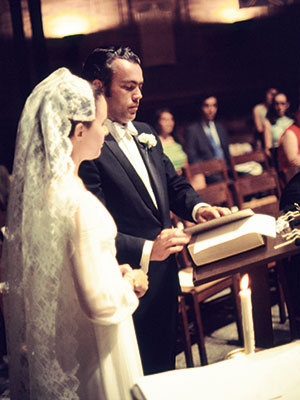
Tetlow grew up in New Orleans, but “Fordham is the reason that I exist,” she said in a video message to the University community in February. Her parents met as Fordham graduate students, and she was born in New York.
Tetlow’s late father, Louis Mulry Tetlow, an educator, clinical psychologist, and former Jesuit priest, earned his Ph.D. At Fordham in 1974, four years after earning a master’s degree from the University. Her mother, Elisabeth Meier Tetlow, is also a double Ram, classes of 1967 and 1970, having earned two of her five master’s degrees—in philosophy and theology—from Fordham. A biblical scholar, she later earned a J.D. from Loyola New Orleans and is the author of several books, including a two-volume work titled Women, Crime and Punishment in Ancient Law and Society.
At the February 10 press conference announcing her appointment as president, Tetlow shared that her mother was “very tickled” to receive an invitation, as a Fordham alumna, to attend the event unveiling the new president of the University.
3. She’s had a Jesuit Catholic education since birth.
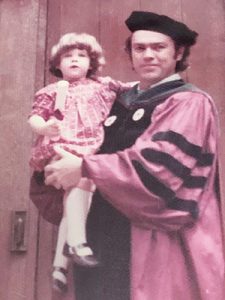
As a newborn, Tetlow was welcomed at the Jesuit community on Marion Avenue in the Bronx, where her parents met. Her father had been a Jesuit for 17 years before leaving the order to start a family.
“I hope that in raising me and my sisters so steeped in the church, in the Jesuit charism, in the Jesuit way of proceeding, that he has really done right by both his family and by the Jesuits,” Tetlow said.
She said her parents instilled in her “an abiding curiosity to find God in all things, which meant going on walks as a child and learning all about the fractal geometry in the curl of a fern. They sang me to sleep with a Gregorian chant and taught me the absolute joy of learning.”
4. Trailblazing politician Lindy Boggs—champion of women’s rights, nine-term member of Congress, and U.S. ambassador to the Vatican—was her mentor.
In 1988, as a first-year student at Tulane, Tetlow wrote to her congresswoman, Lindy Boggs: “I would like to be you when I grow up. Could I please meet you?”
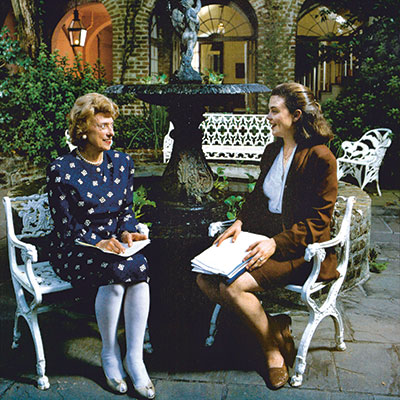
Boggs had represented Louisiana in Congress since 1973, when she succeeded her husband, Hale Boggs, who had disappeared following a plane crash in Alaska. In 1974, she ensured that women would be protected under the Equal Credit Opportunity Act. Two years later, she became the first woman to preside over a Democratic National Convention. She was, Tetlow later wrote, “a powerful politician of unquestioned integrity and famed charms.”
To the teenage Tetlow’s surprise, Boggs’ secretary called her to set up an appointment. “When the day finally arrived, my parents dropped me off at the federal building downtown for my appointment with destiny. I wore stockings, I think, and something approaching a suit,” she wrote in a 2012 essay, “Lindy and Me.”
Tetlow eventually worked as a summer intern in Boggs’ Washington, D.C., office, and when Boggs retired from Congress and accepted a position as counselor to the president of Tulane in 1991, Tetlow was her aide. “Lindy carefully tutored me about women in politics, about power and conscience, about the purpose of a life’s career,” Tetlow wrote.
In a 2019 interview on AMDG: A Jesuit Podcast, she described Boggs as “an incredibly devout Catholic” and an “absolutely brilliant, amazing diplomat. She taught me how to be virtuous and to live your faith in the world not by withdrawing from it and keeping yourself pure, but by engaging with power every day and mattering.”
5. She was 16 when she started college.
Growing up, Tetlow was often ahead of the curve. She skipped fifth grade, started high school at age 12, and four years later, enrolled at Tulane University, where she majored in American studies and earned a B.A. cum laude in 1992.
6. Scholarships transformed her life.
In 1988, Tetlow was a National Merit Scholar and also received a Dean’s Honor Scholarship to attend Tulane. Three years later, she earned a prestigious Harry S. Truman Scholarship, which “made all the difference” in her life, she said in 2019. “It was a high honor that helped me get into, and afford, Harvard Law School and pursue my dream of a career in public service.”
7. Hurricane Katrina changed her.
Last October, Tetlow was invited to preach at First Grace United Methodist Church in New Orleans. Founded in 2007, First Grace united two churches—one with a historically white congregation, one historically Black—that had been damaged by Hurricane Katrina.
Tetlow told congregants that before the storm, she had “spent a lot of time building my sense of myself and my esteem on the idea of getting A’s in school and achieving things younger than most and … the praise I got and the important people that I knew.”
Amid the death, destruction, and despair caused by Katrina, she said, that suddenly felt like a castle made of sand, built on “pride and arrogance.” She ultimately found a way to “let go of my own self-pity and suffering,” she said, and “throw myself into the work, as we all did, of rebuilding and being there for people in their suffering.”
She said First Grace’s story, of congregations overcoming historical divisions and inertia to become one community, inspires her “to find the insight we lose when we’re not paying attention—the urgency that we need [to come together], not just in a crisis.”
8. She’s a former federal prosecutor.
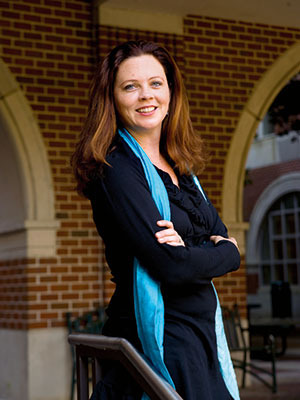
After earning her J.D. from Harvard magna cum laude in 1995, Tetlow spent a year as a law clerk for U.S. Circuit Judge James Dennis and four years as an associate in the New Orleans office of Phelps Dunbar before becoming a federal prosecutor.
From 2000 to 2005, as an assistant U.S. attorney in the Eastern District of Louisiana, she specialized in general and violent crimes and major narcotics cases. She also worked closely with the FBI and other law enforcement agencies to prosecute cases involving financial fraud, arson, wiretap investigations, and bank robberies.
9. She led Tulane’s Domestic Violence Clinic.
In 2005, Tetlow left the U.S. attorney’s office to become the Felder-Fayard Professor of Law and director of the Domestic Violence Clinic at Tulane Law School. She led the clinic for 10 years, securing $2.3 million in grants from the Department of Justice while teaching students to provide legal services to victims of domestic abuse, relationship violence, stalking, and sexual assault.
10. She helped revive the New Orleans Public Library System.
As chair of the New Orleans Library Board and Foundation, Tetlow spearheaded a campaign that raised $7 million to rebuild the city’s flooded public libraries after Hurricane Katrina.
11. She met her Scottish-born husband at a conference to promote cross-cultural understanding.
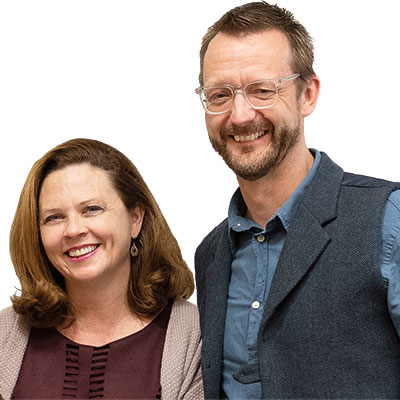
Tetlow and her husband, Gordon Stewart, met in England in 2005 and began dating several years later. They were delegates to the annual conference of the British-American Project, which promotes cross-cultural understanding among young leaders. “In our case it worked out really well,” Tetlow told The New York Times, which published the couple’s wedding announcement on October 3, 2009. Stewart, a master brewer and distiller from Glasgow, Scotland, told the Times he was “impressed when he first saw her on a panel giving a personal account of rescuing her parents in New Orleans after the hurricane two months before.”
12. Her research helped the U.S. Department of Justice develop new anti-discrimination policies.
As a law scholar, Tetlow focused on equal protection, particularly race and gender discrimination. “It’s always mattered to me,” she once said, “to be the kind of academic who had an impact on the world.”
In “Discriminatory Acquittal,” a 2009 article published in the William & Mary Bill of Rights Journal, she described the long history, from the Emmett Till trial to Rodney King and the present day, of juries discriminating against Black victims. She also described how juries use acquittals to “punish female victims of rape and domestic violence for failing to meet gender norms.” Recognizing the unconstitutionality of such acquittals, she argued, would help protect victims. Lawyers in the Justice Department’s civil rights division agreed. They credited the article with helping to inspire a new focus on discriminatory underenforcement of the law in its investigations of police departments.
13. The State Department asked her to join a U.S. delegation to China.
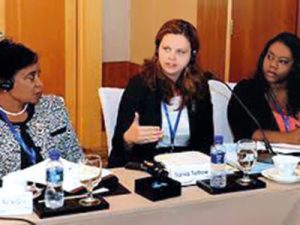
In 2014, Tetlow was one of four people chosen by the State Department to take part in the U.S.–China People-to-People Exchange program, which promotes discussion and collaboration on topics not typically covered in formal government summits. In Beijing, Tetlow shared her expertise on U.S. laws on domestic violence and the support of survivors. She has also provided technical assistance to family law clinics in Rwanda and Iran.
14. She led a complete turnaround of the New Orleans Police Department’s Special Victims Section.
In late 2014, after the New Orleans inspector general found that the city’s police department was misclassifying rape cases as lesser offenses and not properly documenting evidence or following up on cases involving sex crimes, then mayor Mitch Landrieu asked Tetlow to lead the Sexual Assault Reform Advisory Committee.
He “charged us with creating immediate and fundamental systemic reform,” she wrote in an August 2015 article in the New Orleans Advocate after publishing the committee’s report. The report “does not present the typical set of flowery proposals” but instead “lists dozens of practical reforms” to increase the number of detectives in the sex crimes and child abuse units and “create a lasting framework to ensure the quality of their work.”
In June 2016, the inspector general issued a follow-up report: “What was bad before is very good now,” he said. “It’s a remarkable turnaround.”
15. She helped make workforce management policy decisions for New Orleans.
Tetlow served on several boards in New Orleans, including the Civil Service Commission. In that role, she launched a compensation and staffing study of the entire city workforce, made workforce management policy decisions, and adjudicated appeals—all in an effort to make city government more efficient and effective.
16. She sings opera and Gregorian chant.
Tetlow has taken voice lessons on and off throughout her life, and she’s even sung professionally on occasion. At her Missioning Mass on the eve of her inauguration as president of Loyola New Orleans, she led the Jesuits and the choir in singing the “Salve Regina,” a hymn the Jesuits have sung for nearly 500 years.
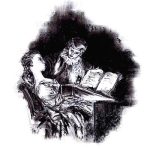 “If nothing else, I sing really well for a university president,” she said with a laugh on the AMDG podcast in 2019, where she also shared that singing opera makes her feel alive.
“If nothing else, I sing really well for a university president,” she said with a laugh on the AMDG podcast in 2019, where she also shared that singing opera makes her feel alive.
17. She took an ‘untraditional path’ to university leadership.
In 2015, she served briefly as associate provost of international affairs at Tulane before being named senior vice president and chief of staff to the president, Michael Fitts—a role not typically seen as a prelude to a presidency but one that gave her a deeper understanding of the full breadth of the university. As one of Fitts’ top strategic advisers, she played a key role in significant advances in admissions, rankings, diversity, research strength, and fundraising. She also spearheaded efforts to make meaningful progress on race and equity, and on addressing campus sexual assault.
In March, NY1 featured Tetlow in a Women’s History Month segment highlighting “modern-day trailblazers.” The host asked her about her penchant for making history. “I think I jumped ahead in some ways by taking an untraditional path,” Tetlow said. “There are many obstacles to women becoming deans and provosts, so instead I was a law professor and then chief of staff to a university president.”
18. She was a transformative leader at Loyola.
Tetlow took the helm at Loyola New Orleans in August 2018, becoming the first woman and first layperson to lead the 110-year-old Jesuit institution. She steered the university through a remarkable economic turnaround after the most financially difficult period in its history. Under her stewardship, Loyola improved its bond rating, increased student retention, saw enrollment rise, and expanded online, graduate, and professional programs.
19. Her vision extends beyond campus.
At Loyola, she led the implementation of a strategic plan for inclusive excellence at the university, where ethnic minorities represent 51% of all undergraduates. And at the height of the COVID-19 pandemic, she oversaw the creation of an undergraduate nursing program in partnership with a New Orleans health system.
20. She was the unanimous choice for Fordham.
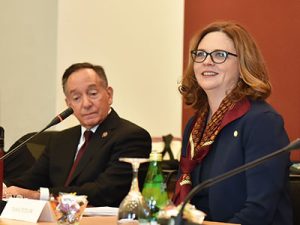
On February 10, after a national search, the Fordham Board of Trustees unanimously elected Tetlow to serve as the 33rd president of the Jesuit University of New York.
“The Board of Trustees and the search committee were deeply impressed by Tania Tetlow from the moment we met her,” Robert D. Daleo, GABELLI ’72, chair of the board, wrote in a message to the University community. “She is deeply rooted in, and a strong proponent of, Ignatian spirituality, and will be a champion of Fordham’s Jesuit, Catholic mission and identity. She has a deep understanding of and comprehensive vision for undergraduate liberal arts and sciences, the Gabelli School of Business, Fordham Law, and all of the graduate and professional schools of the University.”
21. She is a student of history—and of the moral choices we make in ‘a thousand tiny daily tests’ of faith and courage.
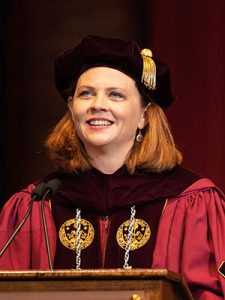
In June, Tetlow said that she was reading Msgr. Thomas Shelley’s book Fordham: A History of the Jesuit University of New York: 1841–2003 and gaining a deeper understanding of the factors and decisions that have fueled the University’s growth.
“There are some who find looking back on history a self-righteous exercise in 20/20 hindsight,” she once wrote, but it teaches us that “moral choices in life are rarely labeled, ‘heroes turn this way, villains the other.’
“The most critical of decisions come in the form of a thousand tiny daily tests … of faith and courage. We learn more when we really put ourselves in the shoes … of those who made the wrong choices. We gain the humility necessary to acknowledge our own blind spots. We gain resolve to see through the fog of denial and get it right the next time, to think about how our grandchildren will look back at our own heroism or failure.”
22. She’s both practical and visionary.
Joseph M. Mcshane, S.J., president emeritus of Fordham, has described his successor as a dear friend, “the perfect choice” for Fordham, and a “great, great administrator” who brought Loyola New Orleans out of “a very difficult moment” four years ago and “really transformed the place.”
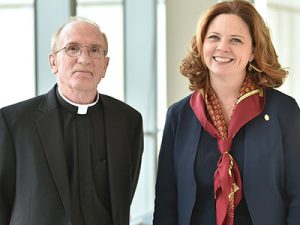
“She’s practical and visionary at the same time—a rare combination,” he said, noting that she “has in abundance the qualities of leadership one needs to run a major university, among them discernment, patience, decisiveness, self-awareness, and magnanimity.
“Her commitment to Jesuit pedagogy and to Fordham’s Jesuit, Catholic mission is both deep and well-informed. I shall rest easy with her in the office I have occupied for almost two decades.”
23. Experts on higher education are impressed by the skill set she brings to the presidency.
In May, Tetlow was a guest on the popular higher education podcast Future U, alongside Holy Cross president Vincent Rougeau. Both of them are the first laypeople to lead their respective Jesuit schools, and they’re also both trained as lawyers, which gives them a special kind of preparation for the challenges of leading large, complex organizations.
Jeff Selingo, co-host of the podcast, identified three key roles university presidents must play to succeed: chief storyteller, chief resource allocator, and chief operating officer—all of which, he said, are things that lawyers could do “very, very well” based on their training, especially lawyers who, like Tetlow, “have a good public presence.”
24. She’s the head of Fordham’s first-ever ‘first family.’
Tetlow and her husband, Gordon, have a 10-year-old daughter, who Tetlow said is “really excited about the family adventure.” Tetlow is also stepmother to Gordon’s teenage son, who lives in Scotland but plans to visit often. And the family includes Archie, a golden retriever who is “still an exuberant puppy,” Tetlow said. She joked that maybe he can learn to be an emotional support dog for students someday. “We are all excited to be part of Fordham,” she said, “to be home.”
25. Her uncle Joseph Tetlow, S.J., is a renowned expert on Jesuit spirituality.
Tetlow has described her uncle Joseph Tetlow, S.J., as her “personal guru for all wisdom in the world.” He baptized her, presided over her and Gordon’s wedding ceremony in 2009, and baptized their daughter, Lucy, in 2012.
For eight years, Father Tetlow served in Rome as head of the Secretariat for Ignatian Spirituality. He has held other important roles, from president of the Jesuit School of Theology at Berkeley to associate editor of America magazine. He is currently writing full time at the Montserrat Jesuit Retreat House in Lake Dallas, Texas.
26. She sees parallels between the Big Easy and the Big Apple.
Soon after moving from New Orleans to New York in June, Tetlow visited Arthur Avenue, the Cloisters, and Rockaway Beach. And she started to see a connection between the two cities that she hadn’t noticed on her many visits to New York.
“One thing I’m realizing driving around is that—I don’t know what your vision of New Orleans is, but it is a gritty port city full of German, Irish, and Italian Catholic immigrants,” she said. “There’s much about the neighborhoods here that makes me feel at home.”
When asked which city has better food, she said, “New Orleans food is extraordinary, and I can’t wait to cook for you”—gumbo is her signature dish—“but New York has amazing food from every country in the world.” Part of what drew her to Fordham, she said, is a belief not only in the power and quality of a Fordham Jesuit education but also in the “limitless and thrilling” possibilities of the “most exciting city in the world.”
27. She’s a thought leader and advocate for young people.
In response to issues of equity in higher education, she has penned several op-eds in national media outlets advocating justice and increased support for the country’s young people. Last December, for example, she called on Congress to increase Pell Grants, creating something like a new GI Bill to help “reboot the economy and preserve it from lasting damage” amid the COVID-19 pandemic. “Think about the impact the GI Bill had on so many of our families and the trajectory of American greatness,” she wrote.
28. Before beginning her service as president, she made a weeklong Ignatian pilgrimage to Rome to mark the 500th anniversary of the conversion of St. Ignatius.
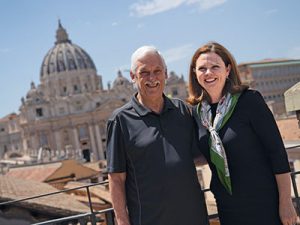
In late June, Tetlow joined a Fordham delegation to Rome, where she met with Arturo Sosa, S.J., superior general of the Society of Jesus; Cardinal Pietro Parolin, Vatican secretary of state; and Cardinal Giuseppe Versaldi, Vatican prefect for Catholic education. She also walked in the footsteps of Ignatius, the founder of the Society of Jesus, who spent 15 years in Rome.
29. She believes Jesuit education inspires people to get into ‘good trouble,’ as the late civil rights leader and congressman John Lewis used to say. And it’s right in tune with the zeitgeist.
In May, the co-hosts of the Future U podcast asked Tetlow about the viability of Jesuit education today. She said it’s not only timeless, backed by “the credibility we get from [nearly] 500 years of academic excellence,” but also right for the moment, when young people are passionate about wanting to question assumptions and fix systems. “The Jesuits have gotten into ‘good trouble’ for centuries by being willing to … ask the hard questions … to really make a difference in the world. That’s who we are in our DNA.”
30. Fordham, she believes, is an antidote to an increasingly divided world.
Tetlow has described the political moment as “treacherous,” with people “cleaving into tribes and drowning in polemic.” Fordham is a key to moving forward together, she insists.
“If you were to design an antidote to a world that is increasingly divided, it would be a place that brings together the best and brightest from every corner of the Earth and teaches them to learn from each other,” she said. “It would be a place that believes in truth and works tirelessly to find it; a place that tries to solve the toughest of problems with science and technology and, most of all, by understanding humanity—what drives us, how we structure our communities and economies … how we build a common good with ethics, empathy, and faith.”
31. She’s excited about getting to know—and learn from—the Fordham community.
In her introductory press conference, Tetlow said she’s excited to talk with faculty about their research and the students they love, and to find out from staff about the ways they constantly work to make Fordham better, and the ideas they have for the future. Most of all, though, she’s excited to connect with students—“to be part of your community, to have you push me, to teach me things, to listen hard to you, to be part of the joy that you bring to the work that we do.”
32. She’ll soon hit the road to introduce herself to alumni.
Tetlow is eager to meet alumni, she said, “to hear about how Fordham changed your life” and “not only gave you the tools to succeed … but to understand that success is about … the life of integrity that you lead, the change you make in the world.” Her tour will begin on August 25 with a reception in Spring Lake, New Jersey. After welcoming alumni and families to campus for Homecoming on September 17, she plans to attend events in Washington, D.C.; London; Fairfield County, Connecticut; and New Orleans. In 2023, she’s planning stops in Phoenix, Chicago, California, and Florida. Learn more and register to attend a reception in your area at forever.fordham.edu/presidential.
33. Her formal inauguration will take place in October.
The University community will celebrate Tania Tetlow’s inauguration during a series of events beginning with the President’s Inaugural Ball for students on September 16, the night before Homecoming, and culminating with the Missioning Mass and installation ceremony on Friday, October 14. Learn more at fordham.edu/inauguration.
